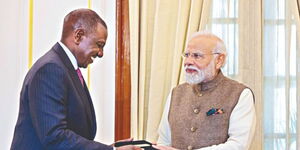The Office of the United Nations High Commissioner for Human Rights has raised concern over the increasing cases of cyberattacks targeting the Kenyan Judiciary, warning that the trend poses a grave risk to judicial independence.
In response to these developments, the UN has indicated that it is considering sending the Special Rapporteur on the Independence of Judges and Lawyers to Kenya for a fact-finding mission.
The move is expected to help assess the extent of the threats and offer guidance on measures needed to protect judicial officers and institutions from digital intimidation.
Chief Justice Martha Koome disclosed the UN’s planned intervention on Monday while opening the 2025 Judges Colloquium themed “Digital Transformation, Technology and Law – Tech Justice.” She welcomed the UN’s interest, noting that an external assessment would provide Kenya with global perspectives on strengthening judicial resilience.
According to the CJ, the planned visit would not only help the Judiciary take stock of the challenges it is facing but also provide authoritative recommendations on safeguarding the independence of judges and courts. She described the engagement as timely and necessary, given the intensity of online attacks witnessed in recent months.
According to CJ Koome, the planned visit would not only help the Judiciary take stock of the challenges it is facing but also provide authoritative recommendations on safeguarding the independence of judges and courts.
The CJ acknowledged that while technology had transformed access to justice, it had also introduced new vulnerabilities. She observed that social media platforms, which serve as key spaces for dialogue and information sharing, had been weaponised to discredit and intimidate judges.
“Over the last one year, we have witnessed a worrying trend of increased cyberbullying, targeted harassment, and orchestrated online campaigns against judges and judicial officers,” Koome said. She warned that the sustained attacks were not ordinary criticism but deliberate attempts to weaken the Judiciary’s moral authority.
She added that the hostile online environment risked creating a chilling effect, where judicial officers may feel pressured to align their decisions with political or commercial interests, undermining the constitutional principles of impartiality and fairness.
The Chief Justice further noted that these challenges had compounded the pressures already facing judges, including heavy caseloads and the emotional demands of sensitive disputes. She revealed that the Judiciary had been forced to explore ways of supporting the mental well-being of its officers.
“It is imperative that we move actively towards developing innovative and sustainable ways of nurturing mental wellness and resilience within the Judiciary. It is in this spirit that we conceived the Judiciary Families Initiative,” Koome explained.
She reiterated that judicial independence was not merely freedom from external influence, but also the assurance that judges could carry out their duties without fear of reprisals, whether political, physical, or digital.
Koome stressed that protecting this independence was critical if the Judiciary was to continue discharging its constitutional role as the guardian of justice, rights, and the rule of law in Kenya.
She urged stakeholders, including the public, government, and international partners, to work together in addressing the emerging threats to judicial officers, warning that the erosion of confidence in the Judiciary would undermine democracy itself.












